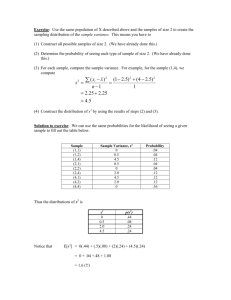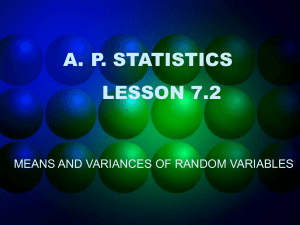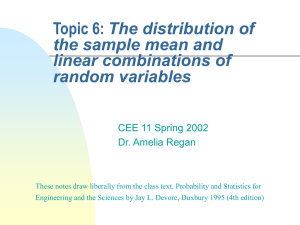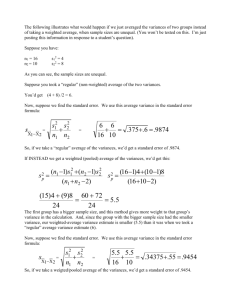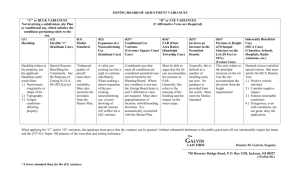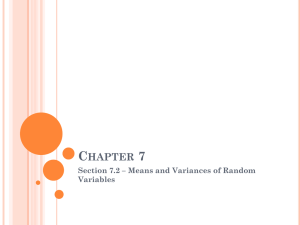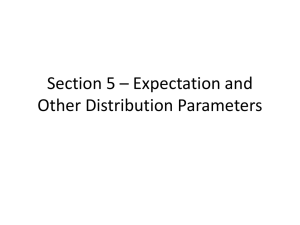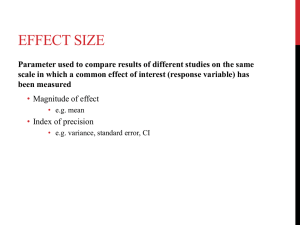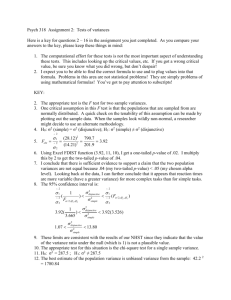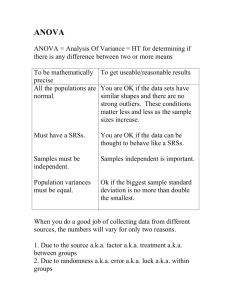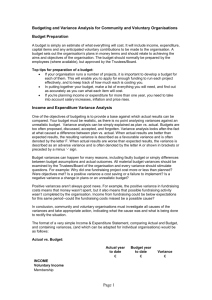ppt
advertisement
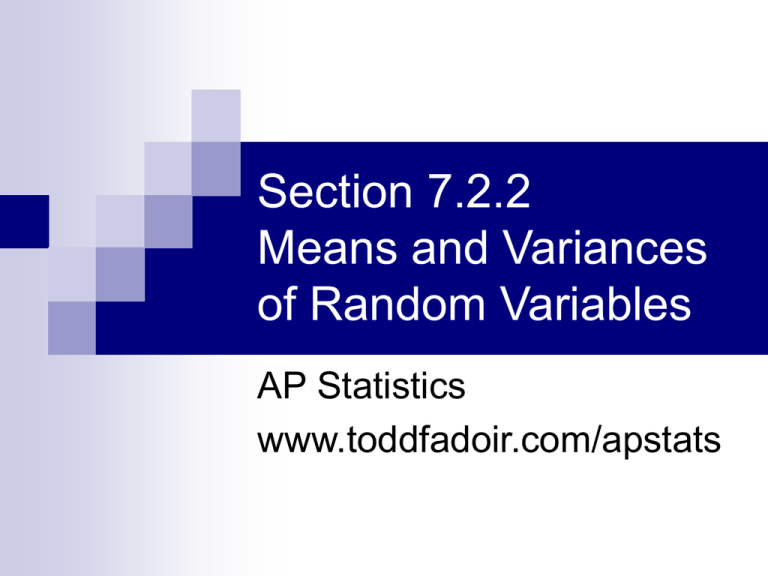
Section 7.2.2 Means and Variances of Random Variables AP Statistics www.toddfadoir.com/apstats AP Statistics, Section 7.2, Part 1 2 Rules for Means Rule 1: The same scale change of elements of a probability distribution has the same effect on the means. Rule 2: The mean of sum of the two distributions is equal to the sum of the means. a bX a b X X Y X Y AP Statistics, Section 7.2, Part 1 3 Rule 1 Example A company believes that the sales of product X is as follows. X 1000 3000 5000 10,000 P(X) .1 .3 .4 .2 X 1000 .1 3000 .3 5000 .4 10000 .2 X 5000 units AP Statistics, Section 7.2, Part 1 4 Rule 1 Example If the expected profit on each sale of Product X is $2000, what is the overall expected profit? X 1000 .1 3000 .3 5000 .4 10000 .2 X 5000 units 02000 X 0 2000X 10,000,000 AP Statistics, Section 7.2, Part 1 5 Rule 1 Example A company believes that the sales of product Y is as follows. Y 300 500 750 P(Y) .4 .5 .1 Y 300 .4 500 .5 750 .1 Y 445 units AP Statistics, Section 7.2, Part 1 6 Rule 1 Example If the expected profit on each sale of Product Y is $3500, what is the overall expected profit? Y 300 .4 500 .5 750 .1 Y 445 units 03500Y 0 3500Y 1,557,500 AP Statistics, Section 7.2, Part 1 7 Rule 2 Example What is the total expected profits combined of both Product X and Product Y? 2000 X 10,000,000 3500Y 1,557,500 2000 X 3500Y 10, 000, 000 1,575,500 11,557,500 AP Statistics, Section 7.2, Part 1 8 Rules for Variances of Independent Distributions Only if the distributions are independent can you apply these rules… Rule 1: If a scale change involves a multiplier b, the variance changes by the square of b. Rule 2: The variance of sum of the two distributions is equal to the sum of the variances. Rule 2b: The variance of difference of the two distributions is equal to the sum of the variances. 2 a bX b 2 2 X X2 Y X2 Y2 X2 Y X2 Y2 AP Statistics, Section 7.2, Part 1 9 Example The Daily 3 lottery has the following mean and variance for its payout: What is the mean and variance of the winnings? X .50 249.75 X 15.80 2 X X 1 .50 249.75 X 1 15.80 AP Statistics, Section 7.2, Part 1 2 X 1 10 Example The Daily 3 lottery has the following mean and variance for its payout: What is the mean and variance of the payouts of playing twice? X .50 249.75 X 15.80 2 X X X .50 .50 1.00 X2 X 249.75 249.75 X X 22.34 AP Statistics, Section 7.2, Part 1 11 Example X .50 The Daily 3 lottery has the following 2 X 249.75 mean and variance for its payout: X 15.80 What is the mean and variance of the X X X .50 365 182.5 payouts of playing every day of the X2 X X 249.75 365 91158.75 year? X X X 301.92 AP Statistics, Section 7.2, Part 1 12 Assignment Exercises, section 7.2: 7.34-7.48 all Exercises, chapter review: 7.54-7.68 all AP Statistics, Section 7.2, Part 1 14
